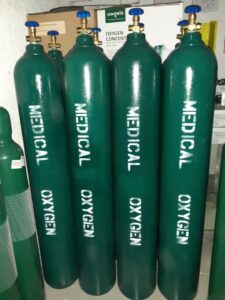Ghana expecting more oxygen plants to manage severe COVID-19 cases
 The Ghana Health Service (GHS) says it is expecting more oxygen plants in the country by August 19 to provide life-saving support to severe cases of COVID-19 admissions.
The Ghana Health Service (GHS) says it is expecting more oxygen plants in the country by August 19 to provide life-saving support to severe cases of COVID-19 admissions.
Dr Patrick Kuma-Aboagye, the Director-General of GHS, told journalists at a media update on the Coronavirus in Accra, on Wednesday that, it had installed the recent oxygen plants it received at the Ga East Hospital and supporting persons with severe cases.
He added that the Service had received 300 ultra-negative fridges to help store different types of COVID-19 vaccines for easy distribution to the regions and districts.
Each region, he said, received two of the ultra-negative refrigerator vans whilst UPS donated 16 oxygen plants to fight the virus.
Meanwhile, Volta, Bono and Bono East Regions are emerging as new hotspots for the Coronavirus infections, especially the Delta Variant.
The Greater Accra and Ashanti Regions remain the traditional hotspots.
The GHS said for instance, the Volta Region, which previously recorded 16 active cases on July 1, had recorded 532 cases as at August 1, while the figures for the Bono Region increased from eight cases to 200 and Bono East from three to 178.
Dr Kuma-Aboagye, the Director-General of Ghana Health Service (GHS), told the media during the Covid-19 Update in Accra on Wednesday that 79 per cent of all Covid-19 cases in the Greater Accra Region were from the Delta Variant.
He said the Delta Variant, which had higher transmission rate and severe disease burden, was becoming dominant and called for stricter enforcement of the safety protocols to prevent escalation of the virus.
He said the situation had resulted in increased workplace and school infections, with active cases increasing from 1,600 to over 6,000 within a month.
The current active cases stood at 6,766 with 854 deaths as at August 1, 2021.
“The current trajectory of cases with still low adherence to Covid-19 safety protocols pose a significant risk of a higher third wave.
“Average cases per day is likely to increase with the attendant increase in severe and critical cases.
“The potential for a negative impact of the outbreak on all sectors is very high, therefore, aggressive efforts at reversing the trend is needed,” Dr Kuma-Aboagye stated.
The Greater Accra Region now has 272 hospital admissions out of, which 36 are critical, 87 severe and 107 mild to moderate cases.
On school infections, he said 404 schools had recorded positive cases of the virus with 2,864 cumulative positive cases and 304 active cases.
Source: GNA
